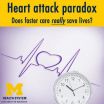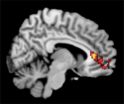(Press-News.org) Observational studies have suggested that lower levels of vitamin D are associated with increased mortality, but whether low vitamin D concentrations are a cause of increased mortality or simply a consequence of poor health is thus unclear.
This is an important question, say the authors, as millions of people worldwide are regularly taking vitamin D supplements, presumably with the aim of preventing diseases and hopefully living longer.
Genetic variants have been reliably associated with circulating concentrations of vitamin D, a marker of vitamin D status. So a research team based in Denmark set out to test the theory that genetically low vitamin D levels are associated with increased mortality, using a technique called mendelian randomisation.
The study involved 95,766 white participants of Danish descent from three cohorts in Copenhagen, who had genetic variants known to affect vitamin D levels.
Other common risk factors, such as smoking status, alcohol consumption, physical activity levels, blood pressure, cholesterol levels and body mass index were also recorded.
Participants were followed from study entry until 2013, during which time 10,349 died.
The results show that genetically low vitamin D levels were associated with increased all cause mortality, cancer mortality, and other mortality, but not with cardiovascular mortality.
These findings are compatible with the notion that genetically low vitamin D levels may be causally associated with mortality from cancer and other causes, say the authors, but also suggest that the association with cardiovascular mortality could be the result of other unmeasured (confounding) factors.
"The clinical implication of our findings remain limited, as widespread vitamin D supplementation can be recommended only after benefit is shown in randomised intervention trials," they conclude.
The borderline significance of the findings means that we should be careful not to over-interpret, warn researchers at the British Heart Foundation Glasgow Cardiovascular Research Centre, in an accompanying editorial.
The epidemiological cliché that "more data are required to confirm these findings" once again applies, they write. Nevertheless, they agree that Mendelian randomisation is a useful tool in clinical research.
However, they point out that several trials of vitamin D supplementation will start reporting in 2017, "so we do not have to wait too long to see whether mendelian randomisation studies and large scale trials are in agreement."
INFORMATION:
Boston, MA -- Police officers in the United States face roughly 30 to 70 times higher risk of sudden cardiac death (SCD) when they're involved in stressful situations--suspect restraints, altercations, or chases--than when they're involved in routine or non-emergency activities, according to a new study from Harvard School of Public Health (HSPH) and Cambridge Health Alliance (CHA). It is the first study to provide data that demonstrates the impact of stressful duties on on-duty SCD.
The researchers also found that physical training activities--which police don't consider ...
ANN ARBOR, Mich. -- A national effort to shave minutes off emergency heart attack treatment time has increased the chance that each patient will survive, a new study suggests. But yet the survival rate for all patients put together hasn't budged.
It seems like a paradox. But wait, say the authors of the new report: the paradox vanishes with more detailed analysis of exactly who has been getting this treatment.
Far more people are getting emergency angioplasty and stents for heart attacks now than before. That number now includes more people with more complicated health ...
Barcelona, Spain: A phase I trial of the first drug designed to inhibit the cancer-causing activity of a mutated enzyme known as isocitrate dehydrogenase (IDH) 1, which is involved in cell metabolism, has shown clinical activity in patients with advanced acute myeloid leukaemia (AML) with the IDH1 mutation.
Professor Daniel Pollyea, M.D. will tell the 26th EORTC-NCI-AACR [1] Symposium on Molecular Targets and Cancer Therapeutics in Barcelona, Spain, today (Wednesday) that early results from the phase 1 clinical trial of the drug AG-120, an oral, selective and potent inhibitor ...
Barcelona, Spain: Researchers have found that patients with an advanced form of kidney cancer, for which there is no standard treatment and a very poor prognosis, respond well to a combination of two existing anti-cancer drugs.
Dr Ramaprasad Srinivasan, head of the Molecular Cancer Therapeutics Section, Urologic Oncology Branch, of the National Cancer Institute in Maryland, USA, will tell the 26th EORTC-NCI-AACR [1] Symposium on Molecular Targets and Cancer Therapeutics in Barcelona, Spain, today (Wednesday) that the combination of bevacizumab and erlotinib produced ...
Barcelona, Spain: Results from a trial of the anti-cancer drug galeterone show that it is successful in lowering prostate-specific antigen (PSA) levels in men with a form of prostate cancer that is resistant to treatment with hormone therapy (castration-resistant prostate cancer or CRPC).
Associate professor Mary-Ellen Taplin, of the Dana-Farber Cancer Institute, Boston, USA, will tell the 26th EORTC-NCI-AACR [1] Symposium on Molecular Targets and Cancer Therapeutics in Barcelona, Spain, today (Wednesday) that galeterone was well tolerated by patients in the ARMOR2 trial, ...
VIDEO:
New research from the University of Copenhagen and Copenhagen University Hospital shows that low blood vitamin D levels increase mortality. The study included 96,000 Danes and was recently published in...
Click here for more information.
Vitamin D deficiency is generally associated with an increased risk of poor bone health. However, recent studies have shown that low levels of this important vitamin also involve an increased risk of other diseases and higher mortality ...
A brief coping strategies therapy which provides stress relief and emotional support for people caring for relatives with dementia can reduce depression and anxiety and improve wellbeing at no extra cost to standard care, new research published in The Lancet Psychiatry suggests.
The study led by Gill Livingston, Professor of Psychiatry of Older People at University College London in the UK, found that family caregivers receiving the START (STrAtegies for RelaTives) programme were seven times less likely to develop clinically significant depression than those given usual ...
A new diagnostic technique -- resulting from monitoring thousands of courtship calls from songbirds -- can be used to safely map the human brain during complex neurosurgery, according to research from Neuroscientists at NYU Langone Medical Center and elsewhere.
The mapping process, first tested in zebra finches, involves gently placing a miniature electrical cooling device at different locations on a small region of the songbirds' brains. This slows down processing of complex neural behaviors, such as a birdsong or human speech.
In a report prepared for the Society ...
DURHAM, N.C. -- Holiday shopping can be mentally exhausting for anyone. But a new Duke University study finds that older adults seem to need extra brainpower to make shopping decisions -- especially ones that rely on memory.
The study appearing Nov. 19 in the Journal of Neuroscience suggests that older shoppers use an additional brain area to remember competing consumer products and choose the better one.
"The study gives a bright picture, actually," said lead author Nichole Lighthall, a postdoctoral researcher in Roberto Cabeza's lab at Duke's Center for Cognitive ...
LA JOLLA, CA--November 18, 2014--"Protein misfolding" diseases such as cystic fibrosis and Alzheimer's may be seriously exacerbated by the body's own response against that misfolding, according to a new study led by scientists at The Scripps Research Institute (TSRI).
The researchers examined patient cells and animal models of several diseases that feature chronic protein misfolding and found that in each case, a cellular defense system against protein misfolding, called the "heat shock response," was overactive. Reducing its activity lessened the signs of disease and ...



